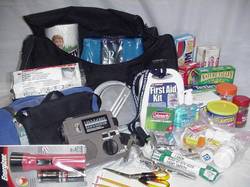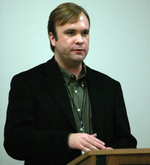The key to fighting terrorism, writes John Robb, is through resilient communities.
Resilient communities are those where, from the bottom up, people learn how to deal with disasters before it happens. It’s simple preparedness, being ready, being drilled, so that when the time comes you don’t panic, and act appropriately.
In Minnesota, the disaster along I-35 is being mitigated by the preparedness of first responders, who have been practicing how to deal with such events for years.
The point is that everyone needs these skills.

I’ll admit I’m very lax on this. I don’t even have a fire escape
ladder (we’re a one-story house). I don’t have a back-up generator. I
don’t have water squirreled away, and I don’t have an emergency kit.
Heck I don’t even have an extra flashlight in the car.
Chances are you don’t either. And this is what makes us vulnerable,
not just to terrorism but to all disasters. Uniquely and supremely
vulnerable.
Conservatives have spent decades talking down government, but
they’re as much to blame for this as anyone. The fact is we all need
better coping tools, and we need emergency supplies on hand, in our
homes, in our vehicles, on our persons.
What will we do if the lights go out?
Here disaster readiness, practical fighting against terrorism, the
complex stability of the Internet and The War Against Oil all come
together.
We don’t need huge power plants, losing half their supplies on the
way into town like kids playing at filling a glass from spoonfuls of
water. We all need our own power sources. Right now these will consist
mainly of gas or diesel generators, and that’s bad. Every home should
have a windmill, every roof should have solar panels. And our
electrical grid needs the ability to deal with rising supplies as well
as rising demand.
Why? To make the system more resilient. More resilient against
terrorists, more resistant against disasters. We have an opportunity,
and an obligation, to become more self-sufficient, all of us,
individually, as families, as members of our local communities.
If you really are serious about fighting terrorism, that’s how to do
it. Learn what to do when disaster strikes. Be prepared. Be resilient.
Knowledge and preparedness can beat fear. Just as they are doing in the
Mississippi River, right now.











A windmill for every pot… You could try turning the Diet Coke that passed through my nose into electrons. That was pretty funny. But I think you’ll find that libertarians have been talking about more distributed production of electricity for the better part of two decades.
It may surprise you that I pretty much agree with your assessment that we get better security against terror and disaster by more distributed production of electricity. It’s a lot like how sprawl makes us more resilient. That point really hit home on 9/11/2001. As I was sitting in a small office building in a suburb in SoCal later that morning, and I looked out the window and counted tens of similar small buildings on the horizon, I realized how unlikely it was that the terrorists would target us with any airplanes they might commandeer in the future.
A windmill for every pot… You could try turning the Diet Coke that passed through my nose into electrons. That was pretty funny. But I think you’ll find that libertarians have been talking about more distributed production of electricity for the better part of two decades.
It may surprise you that I pretty much agree with your assessment that we get better security against terror and disaster by more distributed production of electricity. It’s a lot like how sprawl makes us more resilient. That point really hit home on 9/11/2001. As I was sitting in a small office building in a suburb in SoCal later that morning, and I looked out the window and counted tens of similar small buildings on the horizon, I realized how unlikely it was that the terrorists would target us with any airplanes they might commandeer in the future.
Minnesota
Elections, open appointments, business services, direct access and